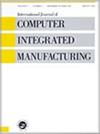Solid modelling approach for 3D tolerance analysis of linear dimension applied to planar faces in an assembly
IF 3.7
3区 工程技术
Q2 COMPUTER SCIENCE, INTERDISCIPLINARY APPLICATIONS
International Journal of Computer Integrated Manufacturing
Pub Date : 2023-09-25
DOI:10.1080/0951192x.2023.2257664
引用次数: 0
Abstract
ABSTRACTThis paper presents a 3D tolerance analysis approach for linear dimensions applied to planar faces in an assembly. The assembly variations are generated and visualized as an explicit geometrical stack-up of the component variations using the solid modeller Solidworks®. The feature variations are obtained by adapting the geometric solid model of each component, either by offsetting the target planar face or by tilting it within the tolerance zone. A concept of Oriented Minimum Bounding Box (OMBB) is introduced to generate individual component variations with any generalized shape of the target planar face. The analysis of the OMBB extents, the tilting angles and the corresponding pivot points has revealed symmetry in these data. Rigorous mathematical formulations have been implemented in this study to handle the general case of large and small displacements. An approach is suggested to evaluate the functional dimensions, the target face’s centroid and normal for each assembly variation. Functional dimensions of the assembly variations obtained by the software ‘3DCS Variation Analyst’ are found to deviate from those obtained by the proposed approach by up to 40% of the assembly tolerance size. 3DCS tool has also failed to detect out-of-specification assembly variations, which were identified by the proposed approach.KEYWORDS: GD&T3D Tolerancingsolid modelinglinear dimensionfeature variationassembly variations Disclosure statementNo potential conflict of interest was reported by the author(s).面向装配平面的三维线性尺寸公差分析的实体建模方法
摘要本文提出了一种适用于装配平面的线性尺寸三维公差分析方法。使用Solidworks®实体建模器生成和可视化组件变化的显式几何叠加。特征变化是通过调整每个部件的几何实体模型来获得的,通过对目标平面面进行偏移或在公差区内倾斜。引入了定向最小边界框(OMBB)的概念,在目标平面任意广义形状下生成单个分量的变化。对OMBB范围、倾斜角度和相应枢轴点的分析揭示了这些数据的对称性。本研究采用了严格的数学公式来处理大小位移的一般情况。提出了一种评估每种装配变化的功能尺寸、目标面质心和法线的方法。发现由软件“3DCS变异分析”获得的装配变异的功能尺寸与通过提议的方法获得的功能尺寸偏差高达40%的装配公差尺寸。3DCS工具也未能检测到不规范的装配变化,这是通过提出的方法确定的。关键词:GD&T3D公差实体建模线性尺寸特征变化装配变化公开声明作者未报告潜在利益冲突。
本文章由计算机程序翻译,如有差异,请以英文原文为准。
求助全文
约1分钟内获得全文
求助全文
来源期刊
CiteScore
9.00
自引率
9.80%
发文量
73
审稿时长
10 months
期刊介绍:
International Journal of Computer Integrated Manufacturing (IJCIM) reports new research in theory and applications of computer integrated manufacturing. The scope spans mechanical and manufacturing engineering, software and computer engineering as well as automation and control engineering with a particular focus on today’s data driven manufacturing. Terms such as industry 4.0, intelligent manufacturing, digital manufacturing and cyber-physical manufacturing systems are now used to identify the area of knowledge that IJCIM has supported and shaped in its history of more than 30 years.
IJCIM continues to grow and has become a key forum for academics and industrial researchers to exchange information and ideas. In response to this interest, IJCIM is now published monthly, enabling the editors to target topical special issues; topics as diverse as digital twins, transdisciplinary engineering, cloud manufacturing, deep learning for manufacturing, service-oriented architectures, dematerialized manufacturing systems, wireless manufacturing and digital enterprise technologies to name a few.

 求助内容:
求助内容: 应助结果提醒方式:
应助结果提醒方式:


